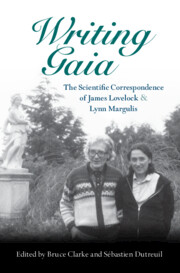Book contents
- Writing Gaia: The Scientific Correspondence of James Lovelock and Lynn Margulis
- Reviews
- Writing Gaia: The Scientific Correspondence of James Lovelock and Lynn Margulis
- Copyright page
- Epigraph
- Table of Contents
- Figures
- Contributors
- Foreword by James Lovelock
- Preface
- Acknowledgements
- Introduction
- Part I 1970–1972
- Part II 1973–1979
- Part III 1980–1991
- 1980
- 1981
- 1982
- 1983
- 1984
- 1985
- 1986
- 1987
- 1988
- 1989
- 1990
- 1991
- Part IV 1992–2007
- Part V Commentaries on Lovelock and Margulis
- Glossary of Names
- Glossary of Terms
- Bibliography
- Index
1981
from Part III - 1980–1991
Published online by Cambridge University Press: 28 July 2022
- Writing Gaia: The Scientific Correspondence of James Lovelock and Lynn Margulis
- Reviews
- Writing Gaia: The Scientific Correspondence of James Lovelock and Lynn Margulis
- Copyright page
- Epigraph
- Table of Contents
- Figures
- Contributors
- Foreword by James Lovelock
- Preface
- Acknowledgements
- Introduction
- Part I 1970–1972
- Part II 1973–1979
- Part III 1980–1991
- 1980
- 1981
- 1982
- 1983
- 1984
- 1985
- 1986
- 1987
- 1988
- 1989
- 1990
- 1991
- Part IV 1992–2007
- Part V Commentaries on Lovelock and Margulis
- Glossary of Names
- Glossary of Terms
- Bibliography
- Index
Summary
With Lovelock’s Gaia published and circulated at the end of the 1970s, the early 1980s see the onset of specialized critiques of Gaia in print. One of the first salvos against the Gaia hypothesis arrived with the publication of biologist W. Ford Doolittle’s skeptical review, “Is nature really motherly?” (Doolittle 1981a), accompanied by defenses of Gaia from both Lovelock (1981b) and Margulis (1981b). Letter 121 states the rushed circumstances putatively accounting for the brusqueness of Lovelock’s response, while summarizing two key premises regarding Gaia’s relation to the principle of natural selection. Later in 1981, Lovelock recounted an encounter with H. D. Holland at a professional meeting: “I was inclined to forget Doolittle but at Hamburg was maddened again by Dick Holland who in response to my talk prattled on about Gaia being Panglossian” (Letter 126), a dismissive trope previously purveyed by Doolittle.277 This current irritation evoked a passionate defense of Gaia and a call to arms: Gaia is in fact well and flourishing. It is just about time that you and I wrote a definite piece to summarise the ten years we have worked on the topic. I’ll be sending you a draft of what I have in mind shortly but briefly it will include: A definition of what we mean by Gaia and the disposal of Mother Earth notions for which I admit some guilt. Something about the consequences of evolution of species by natural selection in an environment which is changed by the evolution. Biogeochemical recursion if you need an academic “bon mot.” (Letter 126)
- Type
- Chapter
- Information
- Publisher: Cambridge University PressPrint publication year: 2022

